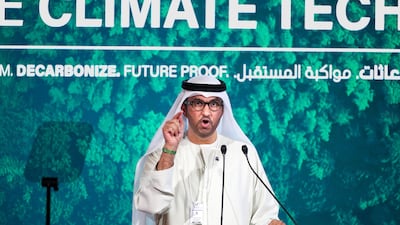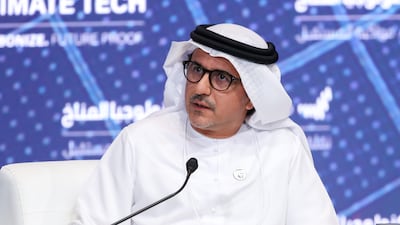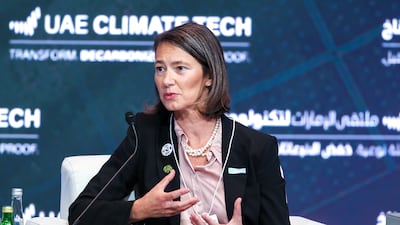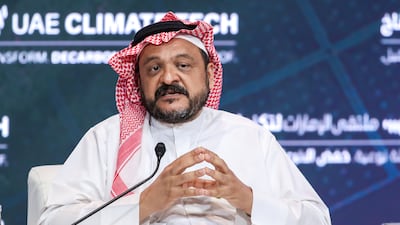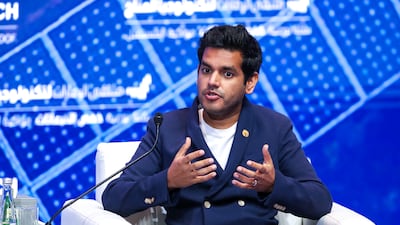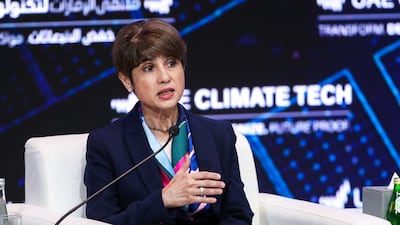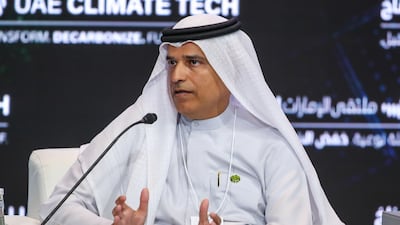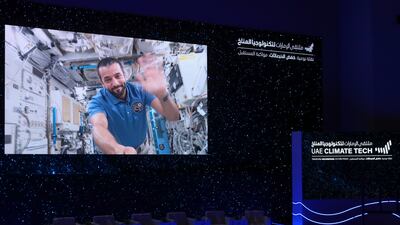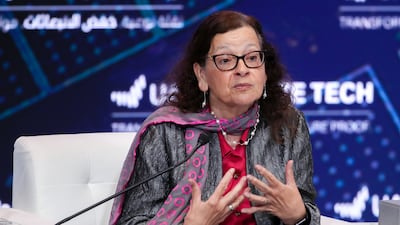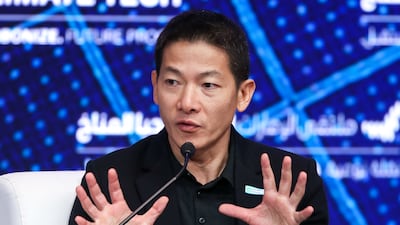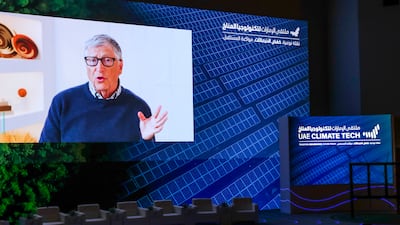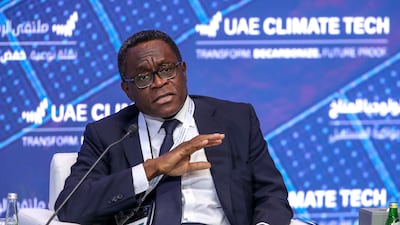More investments are needed in climate technologies, which can help create a new economic development model focused on cutting emissions while ensuring growth, Dr Sultan Al Jaber, President-designate of the Cop28 summit, has said.
"With the right policies stimulating the right investments, climate technologies could at least double their contribution to global growth, while removing 25 billion tonnes of carbon emissions annually,” Dr Al Jaber said at the inaugural UAE Climate Tech forum on Wednesday.
Clean tech investments broke the $1 trillion barrier for the first time last year and clean, mature and emerging technologies “could change the game for progress", he told the event, which was attended by executives, experts and government officials.
“I have seen what can happen, what can unfold when government, finance and technology work together.
“Right here in the United Arab Emirates, when we established Masdar in 2006, there were just six gigawatts of solar energy installed on the whole planet, but now, globally, six gigawatts are added every two weeks. In 2006, the cost of a kilowatt hour of solar energy was over $2, today, it is under two cents," he said.
Dr Al Jaber, who is also the UAE's Minister of Industry and Advanced Technology and special envoy on climate change, said hydrogen as well as other carbon capture technologies can play a major role in the fight against climate change.
“Hydrogen needs to be scaled up and commercialised to make a real impact in the energy system."
Hydrogen, which can be produced using renewable energy and natural gas, is expected to play a key role in the coming years as economies and industries switch to a low-carbon world to mitigate climate change.
French investment bank Natixis estimates that investment in hydrogen will exceed $300 billion by 2030.
Carbon capture technologies are also useful in curbing emissions, Dr Al Jaber added.
“The most recent IPCC [Intergovernmental Panel on Climate Change] report clearly states that applying carbon capture technologies to heavy emitting industries is a critical enabler in the race to net zero," he said.
“Cost remains the main barrier and we need policymakers to incentivise technology companies to help commercialise all kinds of carbon capture, from storage to direct air to mineralisation."
He also urged the industry to use the technology to turn the captured carbon into products with "practical applications that have commercial value".
Global investments in energy transition technology must quadruple to $35 trillion by 2030 to stay in line with commitments made under the Paris climate agreement, according to a report by the International Renewable Energy Agency.
The time is running short and the stakes for our planet are high
Dr Sultan Al Jaber,
President-designate of Cop28
Investments in renewable energy technology reached a record $1.3 trillion last year but that figure must rise to about $5 trillion a year to meet the target of limiting temperature increases to 1.5ºC above pre-industrial levels, the Abu Dhabi-based agency said.
Technologies such as artificial intelligence, robotics and blockchain must be applied to “increase the efficiency of the energy we use today across every sector", Dr Al Jaber said.
In terms of sectors, food systems and agriculture are among the main sources of greenhouse gases, representing more than one third of global emissions.
Technology companies need to focus on this space, he said.
“Along with the United States, the UAE has launched Aim for Climate, a 50-country coalition aimed at maximising the use of commercial technology to reduce emissions and increase the availability of nutritious food around the world.”
Aim for Climate seeks to support small-scale farmers, especially women, and communities in lower-income countries most susceptible to the world's changing climate.
It includes investment to boost the use of vertical farming, hydroponics and aquaculture. The UAE has invested heavily in local companies to grow crops in one of the world's most arid countries.
Dr Al Jaber also called on the oil and gas industry to cut methane emissions by 2030 and align around comprehensive net zero plans by or before 2050.
“The goal for this industry and all industries to me is crystal clear. We need to phase out emissions from all sectors including transportation, agriculture, and heavy industry fossil fuels while investing in technologies.
"For this to happen faster, we need to reimagine the relationship between producers and consumers from one based purely on supply and demand to a relationship that is focused on co-creating the future," he said.
A combined effort is needed to support the goal of an inclusive energy transition, he said.
“We must create an active partnership between the largest producers of energy, the biggest industrial consumers, technology companies, the finance community, government, NGOs [non government organisations] and civil society."
By working together, the goal would be an "accelerated, pragmatic, practical and just energy transition that leaves no one behind, a transition that creates zero carbon pathways for growth", Dr Al Jaber said.
Last year, developing economies, which represent 70 per cent of the world's population, received only 20 per cent of the clean tech investments.
“Technology is essential for helping the most vulnerable communities build capacities and leapfrog into a low-carbon economic development model. But to maximise technology adoption in these countries, we need public, multilateral and private sectors to supercharge climate finance making it much more available, much more accessible and of course, much more affordable.”
The UAE will be hosting Cop28 later this year and Dr Al Jaber said the upcoming event will be “of practical action and pragmatic results".
It will be a "Cop of solutions ... and a Cop for all", he said, adding that "the time is running short and the stakes for our planet are high".
Company%20profile
%3Cp%3E%3Cstrong%3ECompany%20name%3A%3C%2Fstrong%3E%20Ogram%3Cbr%3E%3Cstrong%3EStarted%3A%20%3C%2Fstrong%3E2017%3Cbr%3E%3Cstrong%3EFounders%3A%3C%2Fstrong%3E%20Karim%20Kouatly%20and%20Shafiq%20Khartabil%3Cbr%3E%3Cstrong%3EBased%3A%20%3C%2Fstrong%3EDubai%2C%20UAE%3Cbr%3E%3Cstrong%3EIndustry%3A%3C%2Fstrong%3E%20On-demand%20staffing%3Cbr%3E%3Cstrong%3ENumber%20of%20employees%3A%3C%2Fstrong%3E%2050%3Cbr%3E%3Cstrong%3EFunding%3A%20%3C%2Fstrong%3EMore%20than%20%244%20million%3Cbr%3E%3Cstrong%3EFunding%20round%3A%3C%2Fstrong%3E%20Series%20A%3Cbr%3E%3Cstrong%3EInvestors%3A%20%3C%2Fstrong%3EGlobal%20Ventures%2C%20Aditum%20and%20Oraseya%20Capital%3Cbr%3E%3C%2Fp%3E%0A
Empty Words
By Mario Levrero
(Coffee House Press)
Meghan%20podcast
%3Cp%3EMeghan%20Markle%2C%20the%20wife%20of%20Prince%20Harry%2C%20launched%20her%20long-awaited%20podcast%20Tuesday%2C%20with%20tennis%20megastar%20Serena%20Williams%20as%20the%20first%20guest.%3C%2Fp%3E%0A%3Cp%3EThe%20Duchess%20of%20Sussex%20said%20the%2012-part%20series%2C%20called%20%22Archetypes%2C%22%20--%20a%20play%20on%20the%20name%20of%20the%20couple's%20oldest%20child%2C%20Archie%20--%20would%20explore%20the%20female%20experience.%3C%2Fp%3E%0A%3Cp%3ELast%20year%20the%20couple%20told%20Oprah%20Winfrey%20that%20life%20inside%20%22The%20Firm%22%20had%20been%20miserable%2C%20and%20that%20they%20had%20experienced%20racism.%26nbsp%3B%3C%2Fp%3E%0A%3Cp%3E%22I%20don't%20ever%20remember%20personally%20feeling%20the%20negative%20connotation%20behind%20the%20word%20ambitious%2C%20until%20I%20started%20dating%20my%20now-husband%2C%22%20she%20told%20the%20tennis%20champion.%26nbsp%3B%3C%2Fp%3E%0A%3Cp%3E%3C%2Fp%3E%0A
UFC Fight Night 2
1am – Early prelims
2am – Prelims
4am-7am – Main card
7:30am-9am – press cons
More from Rashmee Roshan Lall
Mercer, the investment consulting arm of US services company Marsh & McLennan, expects its wealth division to at least double its assets under management (AUM) in the Middle East as wealth in the region continues to grow despite economic headwinds, a company official said.
Mercer Wealth, which globally has $160 billion in AUM, plans to boost its AUM in the region to $2-$3bn in the next 2-3 years from the present $1bn, said Yasir AbuShaban, a Dubai-based principal with Mercer Wealth.
“Within the next two to three years, we are looking at reaching $2 to $3 billion as a conservative estimate and we do see an opportunity to do so,” said Mr AbuShaban.
Mercer does not directly make investments, but allocates clients’ money they have discretion to, to professional asset managers. They also provide advice to clients.
“We have buying power. We can negotiate on their (client’s) behalf with asset managers to provide them lower fees than they otherwise would have to get on their own,” he added.
Mercer Wealth’s clients include sovereign wealth funds, family offices, and insurance companies among others.
From its office in Dubai, Mercer also looks after Africa, India and Turkey, where they also see opportunity for growth.
Wealth creation in Middle East and Africa (MEA) grew 8.5 per cent to $8.1 trillion last year from $7.5tn in 2015, higher than last year’s global average of 6 per cent and the second-highest growth in a region after Asia-Pacific which grew 9.9 per cent, according to consultancy Boston Consulting Group (BCG). In the region, where wealth grew just 1.9 per cent in 2015 compared with 2014, a pickup in oil prices has helped in wealth generation.
BCG is forecasting MEA wealth will rise to $12tn by 2021, growing at an annual average of 8 per cent.
Drivers of wealth generation in the region will be split evenly between new wealth creation and growth of performance of existing assets, according to BCG.
Another general trend in the region is clients’ looking for a comprehensive approach to investing, according to Mr AbuShaban.
“Institutional investors or some of the families are seeing a slowdown in the available capital they have to invest and in that sense they are looking at optimizing the way they manage their portfolios and making sure they are not investing haphazardly and different parts of their investment are working together,” said Mr AbuShaban.
Some clients also have a higher appetite for risk, given the low interest-rate environment that does not provide enough yield for some institutional investors. These clients are keen to invest in illiquid assets, such as private equity and infrastructure.
“What we have seen is a desire for higher returns in what has been a low-return environment specifically in various fixed income or bonds,” he said.
“In this environment, we have seen a de facto increase in the risk that clients are taking in things like illiquid investments, private equity investments, infrastructure and private debt, those kind of investments were higher illiquidity results in incrementally higher returns.”
The Abu Dhabi Investment Authority, one of the largest sovereign wealth funds, said in its 2016 report that has gradually increased its exposure in direct private equity and private credit transactions, mainly in Asian markets and especially in China and India. The authority’s private equity department focused on structured equities owing to “their defensive characteristics.”
MEDIEVIL%20(1998)
%3Cp%3E%3Cstrong%3EDeveloper%3A%3C%2Fstrong%3E%20SCE%20Studio%20Cambridge%3Cbr%3E%3Cstrong%3EPublisher%3A%3C%2Fstrong%3E%20Sony%20Computer%20Entertainment%3Cbr%3E%3Cstrong%3EConsole%3A%3C%2Fstrong%3E%20PlayStation%2C%20PlayStation%204%20and%205%3Cbr%3E%3Cstrong%3ERating%3A%3C%2Fstrong%3E%203.5%2F5%3C%2Fp%3E%0A
Formula%204%20Italian%20Championship%202023%20calendar
%3Cp%3EApril%2021-23%3A%20Imola%3Cbr%3EMay%205-7%3A%20Misano%3Cbr%3EMay%2026-28%3A%20SPA-Francorchamps%3Cbr%3EJune%2023-25%3A%20Monza%3Cbr%3EJuly%2021-23%3A%20Paul%20Ricard%3Cbr%3ESept%2029-Oct%201%3A%20Mugello%3Cbr%3EOct%2013-15%3A%20Vallelunga%3C%2Fp%3E%0A
Abu Dhabi GP schedule
Friday: First practice - 1pm; Second practice - 5pm
Saturday: Final practice - 2pm; Qualifying - 5pm
Sunday: Etihad Airways Abu Dhabi Grand Prix (55 laps) - 5.10pm
Company%20profile
%3Cp%3E%3Cstrong%3EName%3A%3C%2Fstrong%3E%20JustClean%3Cbr%3E%3Cbr%3E%3Cstrong%3EBased%3A%20%3C%2Fstrong%3EDubai%20with%20offices%20in%20other%20GCC%20countries%3Cbr%3E%3Cbr%3E%3Cstrong%3ELaunch%20year%3A%3C%2Fstrong%3E%202016%3Cbr%3E%3Cbr%3E%3Cstrong%3ENumber%20of%20employees%3A%3C%2Fstrong%3E%20160%2B%20with%2021%20nationalities%20in%20eight%20cities%3Cbr%3E%3Cstrong%3E%3Cbr%3ESector%3A%3C%2Fstrong%3E%20online%20laundry%20and%20cleaning%20services%3Cbr%3E%3Cbr%3E%3Cstrong%3EFunding%3A%20%3C%2Fstrong%3E%2430m%20from%20Kuwait-based%20Faith%20Capital%20Holding%20and%20Gulf%20Investment%20Corporation%3C%2Fp%3E%0A
What are the influencer academy modules?
- Mastery of audio-visual content creation.
- Cinematography, shots and movement.
- All aspects of post-production.
- Emerging technologies and VFX with AI and CGI.
- Understanding of marketing objectives and audience engagement.
- Tourism industry knowledge.
- Professional ethics.
ITU Abu Dhabi World Triathlon
'Saand Ki Aankh'
Produced by: Reliance Entertainment with Chalk and Cheese Films
Director: Tushar Hiranandani
Cast: Taapsee Pannu, Bhumi Pednekar, Prakash Jha, Vineet Singh
Rating: 3.5/5 stars
Uefa Nations League: How it Works
The Uefa Nations League, introduced last year, has reached its final stage, to be played over five days in northern Portugal. The format of its closing tournament is compact, spread over two semi-finals, with the first, Portugal versus Switzerland in Porto on Wednesday evening, and the second, England against the Netherlands, in Guimaraes, on Thursday.
The winners of each semi will then meet at Porto’s Dragao stadium on Sunday, with the losing semi-finalists contesting a third-place play-off in Guimaraes earlier that day.
Qualifying for the final stage was via League A of the inaugural Nations League, in which the top 12 European countries according to Uefa's co-efficient seeding system were divided into four groups, the teams playing each other twice between September and November. Portugal, who finished above Italy and Poland, successfully bid to host the finals.
Mohammed bin Zayed Majlis



